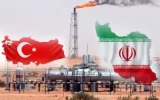Increasing the possibility of extending the Iran-Türkiye gas contract

According to the exclusive report of Energy Press; The Iran-Turkey gas contract ends in 2026, and both countries have expressed their desire to extend this contract. It should be noted that Turkey is highly dependent on imported gas and has recently increased its amount through pipelines and LNG in order to provide the possibility of exporting to Europe and becoming a gas hub in addition to meeting its needs.
Turkey’s LNG imports are likely to increase in the future in order to meet domestic demand and develop exports, which is in line with Ankara’s ambition to become an export hub to Europe. For example, in November 2023, the Algerian state-owned company Sonatrac and Turkey’s Butash company extended the contract for the export of liquefied natural gas to Ankara for another 3 years until it ends in 2027. Accordingly, Turkey will continue to import 4.4 billion cubic meters of Algerian liquefied gas annually. According to official data, Turkey was the largest importer of Algeria’s liquefied gas in the first half of this year. Ankara’s imports from Algeria in the first six months of 2024 (from January to the end of June) amounted to 2.17 million tons.
Meanwhile, Tehran is the second supplier of gas to Türkiye after Russia. According to the information published by the Energy Regulatory Organization in Ankara, Iran’s gas exports to this northern Mediterranean country are approximately 10 billion cubic meters per year. Therefore, Iranian gas is of strategic importance for Turkey’s domestic consumption or even export.
Türkiye’s energy perspective
Türkiye, with about 85 million people, is one of the most populous countries in the Middle East, along with Egypt and Iran. Moreover, unlike many other countries in the Middle East, Turkey’s economy has been growing rapidly over the past few years. This combination of population and economic growth emphasizes and deepens the country’s need for stable and safe energy supply. The main challenge is that the country’s domestic energy resources are insufficient to meet its growing demand. This demand is increasing at an alarming rate.
Turkey has little proven oil and natural gas reserves and is therefore highly dependent on foreign sources. Most of Türkiye’s crude oil and oil products are imported from Iraq, Saudi Arabia and Russia. Most of the country’s gas needs are supplied through imports from Russia, Iran, Azerbaijan (mostly through pipelines) and Qatar, Algeria, Nigeria and Norway (mostly in the form of liquefied natural gas/LNG). In 1996, Iran and Türkiye signed an agreement to export 10 billion cubic meters per year. After several delays, the Tabriz to Ankara pipeline was completed in 2002. Since then, Ankara-Tehran gas relations have faced three major challenges: security, sanctions and price disagreements.
This pipeline is occasionally shut down due to vandalism by the Kurdistan Workers’ Party (PKK). Despite these interruptions and considering Turkey’s increasing demand for gas, Ankara sought to invest in Iran’s natural gas sector. In the late 2000s, the two countries reached an agreement according to which the Turkish National Oil Company, Turkiye Petrolleri Anonim Ortakligi (TPAO), would invest in the development of Iran’s South Pars field, with the aim of increasing gas production and exports. This agreement was never implemented due to the US and international sanctions imposed on Tehran over the nuclear dispute. Also, Türkiye sometimes claims that Iranian gas is more expensive than gas from other sources. In 2012, Ankara took Tehran to the International Court of Arbitration, arguing that Iran was charging too much for its natural gas.
Iran’s energy perspective
Unlike Türkiye, Iran has the largest reserves of oil and natural gas in the world. This country has the largest proven gas reserves (about 18.2% of the world’s total) and 9.3% of proven oil reserves. In addition to its strategic location in the Persian Gulf, Iran is located at the intersection of many current and planned energy transit corridors.
Tags:gas
- Comments sent by you will be published after approval by site administrators.
- Comments that contain slander will not be published.
- Comments that are not in Persian or not related to the news will not be published.

Comments
Total comments : 1 Awaiting review : 1 Date: 0